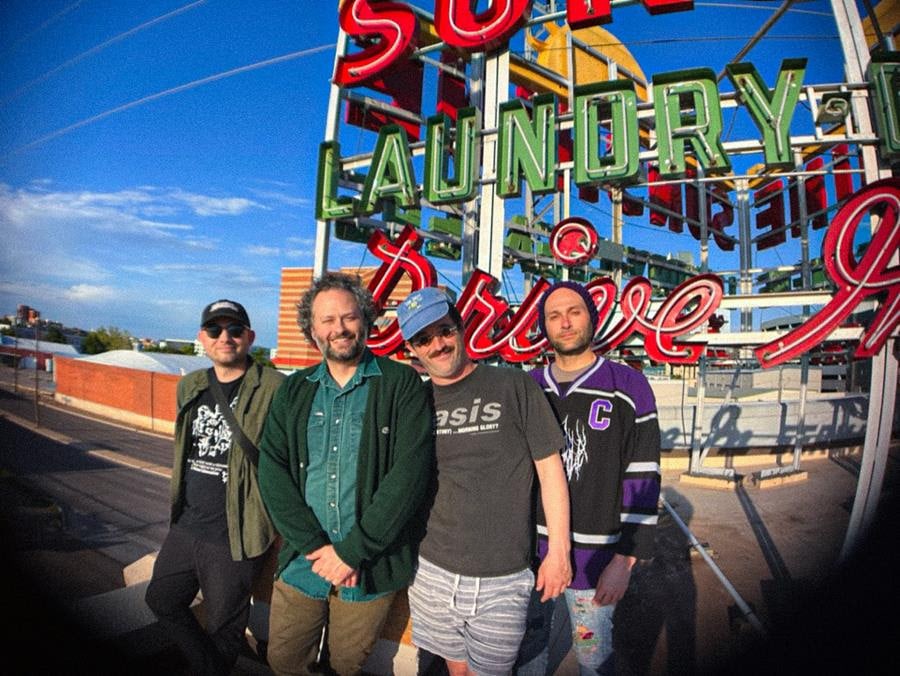 Chat Pile
Bayley Hanes
Chat Pile
Bayley Hanes
Last week, the Oklahoma City metal band Chat Pile waded into their Twitter mentions to respond to a complaint. Their headlining show in London, the user moaned, was only 45 minutes long. “My friend,” the band responded, “I’m begging you to go to a punk show once or twice in your life.” On the surface it’s a fairly unremarkable exchange, simply another example of how Twitter emboldens the loud and the wrong. But beneath the surface, it shows how audience entitlement towards bands is developing and raises troubling questions about what we expect from the musicians who entertain us.
The complainant’s point reflected an ignorance on the length of an average rock show headlining performance. Still, consciously or unconsciously, everyone who attends shows regularly has their own expectations for an acceptable show length. Personally, I prefer it when shows are as laser-focused and tight as possible. I once saw Foo Fighters play for just under an hour: It was great because A) it was all bangers and B) They didn’t have time to play anything written after 2005. On the flipside, I caught a Drake show early in his career during which he spent what felt like 20 unbearable minutes shouting out individual members of the audience as he padded for time; I left knowing he needed a few more hits under his belt, unsatisfied that my money and time ratio was aligned.
There’s also wonder beyond nostalgia to be had in the massive, career-spanning sets favored by veteran acts. Bruce Springsteen and The Cure regularly top three hours at their shows, as does Taylor Swift’s multi-billion dollar grossing Eras Tour. These concerts are designed to bring the spectacle and thoroughness implied by their hefty price tags, but what is expected of stadium-sized heritage acts and the upper echelon of pop performers shouldn’t not be in the same conversation as the punk world. Even though Chat Pile’s song “grimace_smoking_weed.jpeg” is a fantastic one, I doubt even the most steadfast fan would want to hear it on repeat until it hits the runtime of Titanic.
Dismissal of the Chat Pile troll was swift and definitive. He was chastised for viewing live music as transactional, but I’d push back against that. Buying a ticket to a show is transactional, to some degree, but only in the sense that it gives you access to whatever is happening on stage that night. If an artist wants to play an exhaustive set or something far shorter, you pay to witness what they have in store.
That ticket purchase is key. Touring is more expensive for artists than ever yet it remains one of the few ways they can actually make money from music; even if the complaint was silly, the disproportionate outrage it generated stemmed from its attack on one of the last ways a musician can even attempt to live off their craft. Artists, especially independent or new ones, constantly state how important it is that people come out and see them - it can pay the bills in ways that streaming companies and their pittance-like royalty rates simply don't (and even then, it’s by no means reliable, as countless tour cancellations have shown us).
It seems like this message has been warped in transmission though, and, instead of buying some vinyl or a T-shirt, some people now feel an inflated sense of importance, as if a ticket stub allows them to dictate the rules. Anyone who has been in an audience, or even a room of people in recent years, knows that rudeness is part of the deal now. People scroll their phones in movie theaters, they scream at waiters, and everyone is blasting TikToks with no headphones. Fostering a sense of community is difficult and it’s sad to see that extend to the artists whose job is to entertain people.
Maybe live music, a pretty loose and etiquette-free environment, is going through an ungainly transition into a more individualistic age. Perhaps it’s genuinely too much to ask a person who spends the day being catered to by algorithms and delivery drivers to give up that control when they walk inside a music venue. If these audiences are the future of music, one can easily imagine a live show disrupted beyond recognition into a Silicon Valley nightmare. Bands could start offering a range of shows — hours-long sets for the diehards down to half an hour of hits for the casual observer — and let people pick the show that best suits their needs. Ticketmaster could use dynamic pricing to make a killing on the most popular nights. In fact, maybe artists can use A.I. to pick their setlist. It might sound like hell, but let’s not pretend some people wouldn’t be really into it.
I have never seen someone crowd surf to a Netflix show or hug their friends to an Instagram reel. Bringing music out of individual consumption and into the unpredictable live arena remains one of the most thrilling ways of engaging with art. Live shows aren’t at risk because some guy wishes Chat Pile played for longer but maybe it’s a necessary jolt to remind yourself what actually is important about being in the room when an artist performs live. In an age free of consensus on pretty much anything, from geopolitics down to whether The Bear is actually good or not, isn’t it comforting to be on the same page as a large group of people for an hour (or less)?